The Bourne Identity
A movie-length trip into the deep, dark past to explore the history of a war, of war opposition and the very concept of the state
To introduce this piece I will fill out a quote from E. Michael Jones’ The Jewish Revolutionary Spirit that I included near the end of my last one, here the newly-included wording in bold:
But the trajectory set in motion by Judaizing Protestants would find its fulfillment in Cabalistic freemasonry before it would find it in Jewish socialism, described by an American Jew as “the most glorious page in the story of the Jewish people since the destruction of the Second Temple at the hands of Titus”. The Jewish socialists of the early 20th century saw World War I as one more apocalyptic “day of deliverance” which
“finally heaves in sight, and amidst the anguish and suffering of a great world war, a harrowing effect of which no part of the globe is permitted to escape, mankind experiences a new birth, and the Jew, too, at last is about to come into his own… A new day is at hand when the weak and the oppressed of the earth will find themselves permanently delivered… The beginning of this complete emancipation has already been made in the wonderful change in the status of six million Jews wrought over night, as it were, by the Russian Revolution”.
The crucial link between the Protestant and communist revolutionary eras was freemasonry.
Six million Jews? In WWI?? That quote appears to come from William Thomas Walsh’s Characters of the Inquisition, which wasn’t exactly focused on the 20th century. But the point here is the view of socialists of World War I, as an opportunity or a tragedy or something else.
In my piece prior to that one I quoted from the “about” section of the antiwar.com website, which I was saying is a libertarian operation:
This site is devoted to the cause of non-interventionism and is read by libertarians, pacifists, leftists, "greens," and independents alike, as well as many on the Right who agree with our opposition to imperialism. Our initial project was to fight against intervention in the Balkans under the Clinton presidency. We applied the same principles to Clinton's campaigns in Haiti and Kosovo and bombings of Sudan and Afghanistan. Our politics are libertarian: our opposition to war is rooted in Randolph Bourne's concept that "War is the health of the State." With every war, America has made a "great leap" into statism, and as Bourne emphasized, "it is during war that one best understands the nature of that institution [the State]." At its core, that nature includes an ever increasing threat to individual liberty and the centralization of political power.
Now continuing from there:
Antiwar.com is one project of our parent foundation, the Randolph Bourne Institute. It is a program that provides a sounding board of interest to all who are concerned about U.S. foreign policy and its implications.
If you hit the link to that organization you can see there isn’t much information at all at that website, ancient by all appearances. One indicator of that is that it refers to Justin Raimondo as the editorial director of the organization; Raimondo died in 2019, and apparently Scott Horton holds that title now. But it does start with some information on who Bourne was: Randolph Bourne, a notable American journalist, social critic, and political activist of the early 20th century, courageously opposed U.S. intervention in World War I.
A comment under that article by Desert Ramada included a link to an audiobook titled Untimely War, a compilation of Bourne’s essays on war concluding with The State, unpublished material discovered after Bourne’s death during the Spanish flu pandemic. This was edited by James Oppenheim, I assume Jewish, and here from his bio on wikisource:
American poet, novelist, and editor. He contributed short stories, articles, and poems to many leading American magazines, and was the founder and editor of The Seven Arts, an important early 20th-century literary magazine. Oppenheim depicted labor troubles with Fabian and suffragist themes in his novel, The Nine-Tenths (1911).
The book was published in 1919, so during the aftermath from the war, and likely just before the height of the post-war red scare, the Palmer Raids:
The Palmer Raids were a series of raids conducted in November 1919 and January 1920 by the United States Department of Justice under the administration of President Woodrow Wilson to capture and arrest suspected socialists, especially anarchists and communists, and deport them from the United States. The raids particularly targeted Italian immigrants and Eastern European Jewish immigrants with alleged leftist ties, with particular focus on Italian anarchists and immigrant leftist labor activists.
Continuing from the Randolph Bourne Institute bio:
His principled stand cost him dearly, "for few 20th-century American dissenters have … suffered the wrath of their targets as greatly as Bourne did. By 1917, The New Republic stopped publishing his political pieces. The Seven Arts, a literary 'little magazine' Bourne helped to found, collapsed when its financial angel refused further support because of Bourne's antiwar articles." (According to Reiner, the problem was that once Bourne's "biting attacks on government repression began to appear in The Seven Arts," this gave "birth to rumors that the publisher, Mrs. A.K. Raskine, was supporting a pro-German magazine. She… withdrew her support, which closed the magazine down.")
Reiner is Ben Reiner, and with that name I’ll assume he is Jewish (think Rob Reiner) - a search came up empty on him. And the same on A. K. Raskine, but regarding the name: The surname Raskin is of Eastern European Jewish (Ashkenazic) origin, derived from the Yiddish word "rask," meaning "quick" or "fast"... Ashkenazi Jewish matronymic surnames 'Rokhlin,' 'Raskin,' 'Raskine,' 'Rashkin,' and 'Rashkind' are derived from variants of the name. Think Rep. Jamie Raskin. So did she shut him down because American entry into the war had become attractive to her in some way? If so, how? I’ll get to that downstream.
Before that he was silenced by The New Republic, and here from its wiki:
The New Republic was founded by Herbert Croly, Walter Lippmann, and Walter Weyl. They gained the financial backing of heiress Dorothy Payne Whitney and of her husband, Willard Straight, who eventually became the majority owner. The magazine's first issue was published on November 7, 1914. The magazine's politics were liberal and progressive, and as such concerned with coping with the great changes brought about by middle-class reform efforts designed to remedy perceived weaknesses in America's changing economy and society. The magazine is widely considered important in changing the character of liberalism in the direction of governmental interventionism, both foreign and domestic. The most important of the perceived changes was the emergence of the U.S. as a great power on the international scene. In 1917, TNR urged America's entry into World War I on the side of the Allies.
Even before the U.S. entered the war, the Russian Revolution had started in March 1917. During the interwar years, the magazine was generally positive in its assessment of the Soviet Union (founded in 1922) and of Joseph Stalin. TNR changed its position after the Cold War began in 1947, and in 1948, its leftist editor, the former Vice President of the United States Henry A. Wallace, departed to run for president on the Progressive ticket. After Wallace, the magazine moved toward positions more typical of mainstream American liberalism. Throughout the 1950s, the publication was critical both of Soviet foreign policy and of domestic anticommunism, particularly McCarthyism.
Lippmann, the father of modern journalism, was Jewish, as was Weyl. Lippmann in 1947 was a primary player in the creation of the Mont Pelerin Society, along with Austrian Schooler Fredrich Hayek, which can be said to be the originating moment for American libertarianism. From Weyl’s wiki:
Walter Edward Weyl was a writer and speaker, an intellectual leader of the Progressive movement in the United States. As a strong nationalist, his goal was to remedy the relatively weak American national institutions with a strong state.
The pattern of the magazine’s editorial positioning follows that of Jewry in general, pro-Soviet between the wars, then shifting away from that during Stalin’s final purges (notably directed at the Jews) and the rise of the concept of “Stalinism”, but still defending the targets of the red scare in America, who were disproportionately Jewish, just as they had been after WWI. Later, under the leadership of Marty Peretz, the magazine became less leftish and more neoconservative. It was pro-Clinton in the ‘90s and rather notoriously endorsed Joltin’ Joe Lieberman’s brief run in 2004.
Back to anti-war.com:
In 1952, Garet Garrett, one of the last of the Old Right "isolationists," said it well:
"Between government in the republican meaning, that is, Constitutional, representative, limited government, on the one hand, and Empire on the other hand, there is mortal enmity. Either one must forbid the other or one will destroy the other."
“In the Republican meaning” reminded me of the so-typical right-wing refrain that “America isn’t a democracy, it’s a republic”, that always said with a flourish as if dropping a trump card on an opponent. But is this the definition of a republic? Not really, a republic is a government of the people, usually representative but not necessarily via elections, and it’s usually opposed to a monarchy or a dictatorship.
It doesn’t have to be limited or constitutional. An empire has nothing to do with the matter, unless you’re a resident of a land ruled over and not of the land doing the ruling. A democratic state can have an empire, a republic can have an empire, and a monarch or dictator can have an empire. And an empire can even be run by a government which is limited.
Example: there used to be an old joke about Sen. Jesse Helms of North Carolina, who was a very conservative Republican of the southern school (meaning a former “Dixiecrat” Democrat 😄), which was that he thought the government should consist of only four things - the army, the navy, the air force, and the tobacco price supports program. Implicit in that is that an empire can be run with a very limited government, as the historical enforcement mechanism of empire ultimately was the military.
The American problem in this respect isn’t really the giant government, the American problem is the giant military and the corporate capitalism that ultimately takes advantage of that. Once you have that military, what matters is who decides how and when and where to use it. There was a point after Vietnam that the ruling consensus was that it shouldn’t be used, aka the Vietnam Syndrome, and other than with small exceptions that remained the case from the Vietnam pullout in 1973 until Desert Storm in 1991. That doesn’t mean the weapons business stopped, however, or that the military really shrunk, in large part because the cold war continued during that time. And in fact it ramped up when Reagan took office in 1981, which was the same moment when neoconservatism first infected an administration. Military operations eventually followed in Granada and Panama, the baby neocons’ playground being Latin America, setting the stage for Iraq.
When that ended we had something called the end of history, but we’d also developed that something called neoconservatism, and the neocons revived hot warfare and a justifying paradigm to go along with it, Islamic terrorism. Then a decade later “a catastrophic and catalyzing event” (9/11), and also a new villain running a newly-reborn country, Putin in Russia. And the rest, as they say, is now history.
More:
This is the perception that informs our activism and inspires our dedication. Non-interventionism abroad is a corollary to non-interventionism at home. Randolph Bourne echoed this sentiment: "We cannot crusade against war without implicitly crusading against the State." Since opposition to war is at the heart of our philosophy, and single-issue politics is the only avenue open to us, Antiwar.com embodies the politics of the possible.
Again, not really accurate. Can one crusade against water pollution without crusading against rivers and lakes? Of course. This is the usual throwing out the baby with the bath water thing. But it all depends on the definition of the state, which is not quite as clear as it might seem. We’ll get to that.
What they are also admitting here is that they can’t sell their brand of extreme free-market capitalism, that would be the politics of the impossible, and so they are trying to suck people in with their solidly anti-war posture at a point where Americans should be truly sick of war.
Our dedication to libertarian principles, inspired in large part by the works and example of the late Murray N. Rothbard, is reflected on this site. While openly acknowledging that we have an agenda, the editors take seriously our purely journalistic mission, which is to get past the media filters and reveal the truth about America's foreign policy.
Two important things here, first that a large part of libertarian principles are concerning economics, and that means Austrian School free-market capitalism economics. Second, they have an agenda, one assumes related to that, the selling of that, the politics of the impossible. But they are also purely journalistic, in that they strive to tell the truth about US foreign policy. One can only decide for one’s self if they actually manage to do that. And by that I mean both having an agenda and being purely journalistic, and also telling the truth about US foreign policy.
To get a look at this war from an adjacent viewpoint, let’s turn to anarcho-libertarian (specifically an anarcho-voluntaryist) and neo-Bircher James Corbett and his 2018 documentary on the war, here laying the groundwork for the grand conspiracy behind it all:
This not-so-secret society kind of reminds me of the Mega Group, including the 1998 article in the Wall Street Journal about the founding of the group. The general narrative here is that the British created the war for the central purpose of defeating Germany, a rising economic power since unification in 1871. A narrative with which I agree, but it’s a narrative that gets lost in this documentary, as we shall see.
Why that war happened is broadly a matter of historical bafflement. Some say it’s because Europe hadn’t had a major conflict since Napoleon’s prime and so they were all just ready and itching for one. Some say it’s because of the alliances and that the assassination in Sarajevo unthinkingly triggered them into action like dominos falling, something that should give pause to the west today regarding security guarantees to Ukraine.
My personal understanding of the war initially came not from memory of studying it in school, but rather in seeing two films in the ‘60s, The Blue Max in 1966 about German flying aces, and the British (Dickie Attenborough) musical Oh, What a Lovely War! in 1969. The first said something about class and war, the elite drawing their sabers in the sky, maybe for the last time in that war, and the latter about the seeming pointlessness of that bloody war. As with military technology, it seemed like a war where the past confronted the present, and by the end the past was definitely put in the past, for good. The nobility of war myth was on its last legs.
The connection of all of that Rhodes stuff to WWI seems dubious to me, but the part of that which matters is the realignment with America, the resubjugating of America into their empire, which is the construct underlying this historical theory. Next the Quigleyite Grove will stumble though his attempt at linking them, ending with a century of control and slavery that could have been prevented 🙄, and Corbett will pick up the pieces in his scripted explanation of the Boer War for the purpose of cementing the group of conspirators, borrowing from not conventional history but conspiracy history:
So there we see this same cabal in South Africa linked not to WWI more than a decade later but to American financial power decades later, thanks to G. Edward Griffin and the John Birch Society. And JP Morgan at the beating heart of that.
Next Corbett gets to the linkage, the dragging of America into the war constructed by this cabal, and then someone else exploring this more modern cabal:
Here Corbett brings into his story the one indispensable character, Col. Edward Mandel House, and also another unforgettable sin of the Wilson administration, the creation of the Federal Reserve Bank. The unknowing puppet in all of this is of course Wilson, apparently the most evil person to ever live in some circles today.
One thing I got wrong there was JP Morgan’s death - he died in 1913, before WWI began and years before America entered it. So we have two key figures in this story, Rhodes and Morgan, who are dead before the drama even begins.
There I indicated the blank spot where Jacob Schiff existed in Corbett’s telling of this history, and note that at the end where Griffin names five international banking families with faith in Col. House three of them - the Schiffs, the Kahns and the Warburgs - were Jewish. In fact that really comes down to Schiff (who managed not to die until after the war was over 😁), as both American Warburgs, Felix and Paul, worked for him at his Kuhn Loeb Bank, and here is a bit on Kahn from a document titled Introducing Otto H. Kahn:
An outstanding character within New York's "Our Crowd" of German-Jewish elite, Kahn was a partner and spokesperson for Kuhn, Loeb and Company (the investment house second only to J.P. Morgan and Co. among America's private banks), and he was the most influential patron of the arts ever known in America.
There is a famous quote by John D. Rockefeller when Morgan died - here from Business Insider:
When he died in 1913 at the age of 75, it was revealed that he was worth around $80 million — according to legend, John D. Rockefeller remarked, "And to think he wasn't even a rich man!" upon reading the figure, according to Jean Strouse's article for the New York Times.
What I have read is that part of the reason for that was that by the time he passed his company was heavily leveraged to Kuhn Loeb. Oh, and Schiff was Rockefeller’s banker, which reduces Griffin’s five international bankers down to one. The one that Corbett never mentions.
Here is small part of the list of the “Association of Helpers” from Quigley’s The Anglo-American Establishment, including what Griffin referred to as “the very small American roundtable group”:
Steit is actually Streit, btw. He was part of the delegation to Versailles and a Rhodes scholar. I suspect he was Jewish - his family was of German origin and his mother’s maiden name was Kirshman.
From Aydelotte’s wiki: He became one of the first Rhodes Scholars and studied at Brasenose College, Oxford University. Aydelotte was the American Secretary to the Rhodes Trust from 1918 to 1952, overseeing the American program of the Rhodes Scholarship.
Also this:
Aydelotte was a member of the Anglo-American Committee of Inquiry that recommended Britain allow significantly more Jews to emigrate to Mandatory Palestine after World War II. In his diary, he wrote: “I left Washington pretty strongly anti-Zionist... But when you see at first hand what these Jews have done in Palestine... the greatest creative effort in the modern world. The Arabs are not equal to anything like it and would destroy all that the Jews have done... This we must not let them do.” However he also was clear in his opposition to the partition of Palestine and his support for equal rights for Arabs and Jews in Palestine.
Greene had roots deep into American WASP political elite; here is part of his wiki:
Greene graduated from Harvard College by 1897 and became secretary to Harvard University's president and the Harvard Corporation from 1901-1910. This gave him contacts with Wall Street which made him general manager of the Rockefeller Institute from 1910-1912. Later, Greene became an assistant to John D. Rockefeller in philanthropic work for two years, then trustee to the Rockefeller Institute, to the Rockefeller Foundation, and finally to the Rockefeller General Education Board until 1939.
So a Rockefeller man. More:
For fifteen years (1917-1932) he worked for the Boston investment banking firm of Lee, Higginson & Co; most of those years serving as its chief executive officer, as well as with its London branch. He was executive secretary of the American section of the Allied Maritime Transport Council stationed in London, England 1918. He lived in Toynbee Hall, the world's first settlement house. This brought him in contact with the Round Table Group in England, a contact which was strengthened in 1919 when he became secretary to the Reparations Commission at the Paris Peace Conference. Accordingly, on his return to the United States he was one of the early figures in the establishment of the Council on Foreign Relations which served as the New York branch of the Lionel Curtis Institute of International Affairs.
Lionel Curtis is on Quigley’s list of the Society of the Elite. And the last one listed:
George Louis Beer was a renowned American historian of the "Imperial school". He was colonial expert to President Woodrow Wilson's American Commission of Inquiry during World War I and attended the 1919 Paris Peace Conference as an influential member of the American Commission to Negotiate Peace.
Born in Staten Island, New York, to an affluent family that was prominent in New York's German-Jewish community. Beer's father owned a successful Cuban tobacco importing business. He studied at Columbia University, where he received the A.B. degree (1892) and then an A.M. degree in 1893. Beer's master's thesis ("The Commercial Policy of England Toward the American Colonies") was supervised by Professor Herbert Levi Osgood and was immediately published in the Columbia University Studies in History, Economics and Public Law. Beer was also influenced by John W. Burgess and Edwin Seligman.
Osgood was a leading “Imperial School” historian, a brand of Anglophilia which admired the British empire. Seligman was the son of Joseph Seligman, a leading German-Jewish banker in the US who was closely associated with Jacob Schiff; his family was also related to the Guggenheims. He was very involved in the war financing of the union during and after the Civil War.
From his wiki:
In 1877, Judge Henry Hilton, the owner of the Grand Union Hotel in Saratoga Springs, New York, denied entry to Seligman and his family because they were Jews, creating nationwide controversy. It was the first antisemitic incident of its kind in the United States to achieve widespread publicity.
This incident goes on to make up a major portion of his wiki - antisemitism, you know, ain’t it a bitch?
Btw, from Burgess’ wiki:
In a 1904, Burgess argued for close British, American and German relations, justifying it in part on the basis of "ethnic affinity". He also argued that Swedes, Danes, Norwegians and the Dutch were "probably the purest Teutonic stock, and the best stock, in Europe". He added that it was a "sober truth that the Teutonic genius and the Teutonic conscience are the two greatest forces in modern civilization and culture."
In any case, there’s a kind of WASP-Jewish alliance going on there. But oddly no Morgan man, just a Rockefeller man and perhaps a Schiff man. I will note that the list of the Society of the Elect starts with Cecil Rhodes and Nathan Rothschild, father of Walter Rothschild. Oh, and on this list that goes on for four pages Col. House’s name does not appear anywhere. In fact Col. House is not mentioned in the book at all - Quigley wrote it in the late ‘40s but couldn’t get it published, and then it was finally published in 1981, after Quigley’s death and after the JBS had used his work - Tragedy and Hope published in 1965 - to create their narrative and so created more interest in his work. But that didn’t stop Corbett 37 years later, instead apparently relying on Bircher lore.
Oh, also note Percy Corbett from Canada - James is a Canuck, so maybe… 🤔
Just as a further example of the video work I did several years ago on the right’s view of Wilson generally and how that connects to the Bircher view specifically, here is a clip addressing the ubiquitous Col. House; Pipes is elder neocon Richard Pipes, btw, or maybe his neocon son Daniel, I don’t remember:
Having that framework on this war, such as it is, let’s finally turn to Bourne, the compilation of his work Untimely Papers, which was published by B. W. Huebsch:
Benjamin W. Huebsch was an American publisher in New York City in the early 20th century. Huebsch was the son of Rabbi Adolphus Huebsch, who had immigrated to the United States from Hungary in 1866 and died in New York, 1884. Beginning work in his older brother's small print shop, which he gradually transformed into a publishing house. In 1900, Huebsch established the publishing house B. W. Huebsch.
…and an essay titled the War and the Intellectuals:
What surprised me most here was his criticism of socialists. One of the things significantly discussed in the book Trotsky in New York City 1917 was the debate in the NYC Marxist community over support or opposition to US entry in the war at that time, which was mid-January to late March 1917; the US officially declared war on the central powers at the beginning of April. And my impression was that no one was really for the war, rather those taking a position of not opposing it were doing so for practical political reasons. The communist radicals definitely saw the war as an opportunity, a trigger for revolution, which came in Russia in March just before Trotsky left to join in on that.
Recently I cited the 1917 NYC mayoral election as the high-water mark for the Socialist party, with candidate Morris Hillquit getting over 20% of the vote. Here is the wiki on that, and note the last part of the text there which addresses Hillquit’s position on the war:
From Hillquit’s wiki:
Morris Hillquit was a founder and leader of the Socialist Party of America and prominent labor lawyer in New York City's Lower East Side. Together with Eugene V. Debs and Congressman Victor L. Berger, Hillquit was one of the leading public faces of American socialism during the first two decades of the 20th century. In November 1917, running on an anti-war platform, Hillquit garnered more than 100,000 votes as the Socialist candidate for mayor of New York City.
Hillquit was born Moishe Hillkowitz on August 1, 1869, in Riga, Russian Empire, the second son of German-speaking ethnic Jewish factory owners. From the time he was age 13, young Moishe attended a non-Jewish secular school, the Russian language Alexander Gymnasium. In 1884 when Moishe was 15, his father, Benjamin Hillkowitz, lost his factory in Riga and decided to leave for America to improve the family's financial situation. Together with his oldest son, he set out for New York City, where he procured a two-room apartment in a tenement house.
No mention of the adverse impact on Jews of the 1881 assassination of czar Alexander II. Here is some of Berger’s wiki, one of two socialist congressmen during that inter-war period, the other being Meyer London, a Jew representing the lower east side who was born in Russia, in Lithuania of the Pale, and whose family emigrated to the US in 1888:
Victor Luitpold Berger was an Austrian–American socialist politician and journalist who was a founding member of the Social Democratic Party of America and its successor, the Socialist Party of America. Born in the Austrian Empire (present-day Romania), Berger immigrated to the United States as a young man and became an important and influential socialist journalist in Wisconsin. He helped establish the so-called Sewer Socialist movement, and also sparked the American Socialist Party's nativist turn. In 1910, he was elected as the first Socialist to the U.S. House of Representatives, representing a district in Milwaukee, Wisconsin.
In 1919, Berger was convicted of violating the Espionage Act of 1917 for publicizing his anti-interventionist views and was denied the seat to which he had been reelected in the House of Representatives. The criminal verdict was eventually overturned by the Supreme Court in 1921 in Berger v. United States. Berger was subsequently elected to three successive terms in the 1920s, for which he was seated.
Berger was born into a Jewish family on February 28, 1860, in Niederrehbach, Austrian Empire (modern Romania). He was the son of Julia and Ignatz Berger. He attended the Gymnasium at Leutschau (today in Slovakia), and the major universities of Budapest and Vienna.
Debs famously did time as well; he ran for president in 1920 from his jail cell:
Debs's speeches against the Wilson administration and the war earned the enmity of President Woodrow Wilson, who later called Debs a "traitor to his country". On June 16, 1918, Debs made a speech in Canton, Ohio, urging resistance to the military draft. He was arrested on June 30 and charged with ten counts of sedition.
In any case, I am not aware that socialists, in general or their intellectual subset, significantly caved to war fever in those days. So I don’t know what he’s saying, but I can see why libertarians would be fine with using this, not being fans of socialism, to say the least.
Desert Ramada in his comment on Bourne said this: ‘He was an intellectual, a socialist (he started as a Georgist, as all intellectuals did in that era)’. His bio at the Institute site says nothing about his socialism, which seems rather apparent, and probably because they’re using him for libertarian purposes. As for Georgism, I doubt all intellectuals did anything in common, in that era or any other. But Georgism, or geoism, is an interesting matter:
Georgism, in modern times also called Geoism, and known historically as the single tax movement, is an economic ideology holding that people should own the value that they produce themselves, while the economic rent derived from land—including from all natural resources, the commons, and urban locations—should belong equally to all members of society.
George popularized the concept of gaining public revenues mainly from land and natural resource privileges with his first book, Progress and Poverty (1879). The philosophical basis of Georgism draws on thinkers such as John Locke, Baruch Spinoza, and Thomas Paine. Economists from Adam Smith and David Ricardo to Milton Friedman and Joseph Stiglitz have observed that a public levy on land value does not cause economic inefficiency, unlike other taxes. A land value tax also has progressive effects. Advocates of land value taxes argue that they reduce economic inequality, increase economic efficiency, remove incentives to under-utilize urban land, and reduce property speculation.
Georgist ideas were popular and influential in the late 19th and early 20th centuries. Political parties, institutions, and communities were founded on Georgist principles. Early devotees of George's economic philosophy were often termed Single Taxers for their political goal of raising public revenue mainly or only from a land-value tax, although Georgists endorsed multiple forms of rent capture (e.g. seigniorage) as legitimate. The term Georgism was invented later, and some prefer the term geoism as more generic.
So there is a commonality in geoism as a root for both equality-focused socialism and liberty-focused libertarianism, but one aspect which binds libertarianism and Bircherism is hatred of Wilson’s personal income tax.
Amusingly, last week I watched Kim Iversen praising MTG for her surprising change of politics, and one of the things she praised her for was some comment about getting rid of property tax, with which Kim agreed, not understanding why property is taxed. I guess that she has no idea that property taxes, which are not assessed at a federal or state level, pay for things like local public schools:
Property tax is an ad valorem tax, meaning it is based on the value of a property. It is not levied by the state government but by thousands of local government entities, including counties, cities, and school districts. These local bodies set their own tax rates based on their budgetary needs, which is why rates can vary significantly between neighboring towns. The revenue generated from these taxes is the primary funding source for public education, police and fire departments, road maintenance, libraries, and parks. Because these services are managed at the local level, every state relies on this funding mechanism.
But Kim thinks getting rid of property tax is somehow progressive, I guess. Defund the fire department! 😄 Btw, Cigaar at RP did a segment on this which doesn’t agree with Kim but rather used it as a blatant attack on boomers. Me, I pay a shit-ton of property tax in the Bay Area of California, I also pay property tax here in Colombia, both of those make up the vast majority of the taxes I pay, and I don’t complain about that at all. I also have voted for all the increases related to municipal services including most importantly for the schools - and good public schools increase property values.
So fuck your boomer-bashing, libertard desi-boy, and remember that boomers like me came of age in the ‘70s right when incomes stagnated in the US and when equal opportunity affirmative action for victim groups became a real thing. I’m sure his mental image of a boomer is an old white guy sitting in a big empty house gifted to him by circumstance watching mainstream corporate news and falling asleep…
Just sayin’.
Back to Bourne, he uses the term “Fabian” as an adjective here, “biding their time with Fabian strategy”, and one can assume that means an evolutionary tactic and not revolutionary, since that’s the fundamental characteristic of Fabian socialism. But it’s also a very British term, the Fabian Society being a British organization, and those things, the wolf in sheep’s clothing logo business and some of the people involved has made it a particularly attractive target for the Bircher/neo-Bircher crowd.
He frames intellectuals as a particularly serious problem, but some of that is very personal, most pointedly his own debate over the war with his mentor at Columbia, John Dewey, and others (the essay Twilight of Idols in the book focuses on that), and that gets transferred to Wilson as a condemnation, who was of course the president of Princeton.
He moves from there to colonialism, the re-donning of the clothes of British subjects, which of course is easily translatable to the neo-Birchers’ Quigleyite Anglo-American empire thing.
Next he speaks of the possibility of the offspring of Europe debating these matters over here and coming to a settlement that could be repatriated over there, which is a thought suggestive of his opposition to the concept of the American melting pot. That gets me to his admiration for Horace Kallen, who I will get to shortly.
The next interesting term he uses, absolutely related to his own “Kallenization”, is “Magyarization”, the deracination of ethnic sub-groups within a nation, and that gets us to a debate which extends in American to the present day but also applies to Ukraine going back to the Russian empire. In fact a direct commonality between the term and that country today is Transcarpathia (Ruthenians in dark green here).
When he eventually moves from intellectuals back to socialists, it suggests a commonality within those two groups which he claims had sold out to the warmongers over the course of the war, and what might that common sub-group be?
At the end he compares the chosen people Jew to the intellectual, which perhaps gets closer to the point than he intends or knows. My memory is that this is the only use of the word “Jew” in the book, but don’t quote me on that.
Moving on to The State and the beginning of the second segment of that unfinished book:
As much as he ever does in this material, I think, Bourne defines what he means by a state. He separates that from a nation, a people or peoples, occupying a certain geographic area one assumes, and government, which is the mechanism of binding authority over those people and that land. What it seems to me is that in contemporary terms what he’s referring to as the state is the deep state, all the non-democratic forces which have control over that government, operating against the will of those peoples or controlling that will.
With regard to those peoples, part of Bourne’s wiki:
Bourne was greatly influenced by Horace Kallen's 1915 essay, "Democracy Versus the Melting-Pot". Like Kallen, Bourne argued that Americanism ought not to be associated with Anglo-Saxonism. In his 1916 article "Trans-National America," Bourne argued that the United States should accommodate immigrant cultures into a "cosmopolitan America," instead of forcing immigrants to assimilate to the dominant Anglo-Saxon-based culture.
Kallen is someone I mentioned recently, as the founder of the Parushim, the Zionist secret society of which Louis Brandeis was an important part. Zionism becomes an important part of this story, related to the influences which resulted in Wilson’s decision to enter the war and on the side of the British. The Bircher narrative is that Col. House the Anglophile was the key player in that, and my work in all those videos had a central purpose of exploring the impact of elite Jews, Zionist Jews, on that decision, that tied to British Zionists and the Balfour Declaration, finalized and made public in late 1917.
One of the characters involved in that was Sir William Wiseman, who I started to explore in this video…
…which is what I clipped from for the second part of the earlier video clip starting with Corbett’s documentary, addressing the US entry into the war related to House.
The question that arises here is if Bourne got shut down at The New Republic and The Seven Arts in 1917-18 because the Jews running those publications had flipped on the war at least in part based on Zionist desires to get the US into the war on the side of the British to ensure that they would control the fate of Palestine after it ended. Or maybe in part because of the Russian revolutions in 1917, a consequence of the war, that had dramatically changed the fate of Jews in that country, a fate that would only be ensured by the defeat of the central powers - think about the treaty of Brest-Litovsk in early 1918 which divided the Pale.
And think about Churchill’s 1920 article on the basic matter.
The game definitely had changed in 1917, at least for the Jews. But for Bourne the anti-war absolutist, that may have meant the ground was shifting under his feet, because he was standing on kosher soil. Another thing to consider here are that the socialist intellectuals he was talking about were Jews who had become Zio-converts as that possibility was looking to become a reality. Think about Stalin after WWII when he discovered to his dismay that a lot of communist Jews in his state had become “dually-loyal” with regard to the Jewish state in 1948, kicking off those final purges. Think about all the socialist kibbutzes in the early days of Israel, including the ones where Gnome Chomsky and Bernie Sanders did their time.
Bourne then goes to executive as monarch, because foreign policy is the purview of the executive and not of the legislature. There are actually good explanations for that, especially since military technology has advanced so much - think about the nuclear button and then imagine it being on Mini Mike Johnson’s desk during a role call vote of the House while Russian ICBMs cross the Arctic. In his time that wasn’t yet the case, which suggests other reasons for this development. But one can see where open, Democratic debate over a matter like war could easily be problematic, given the dynamics of such conflict. And Bourne clearly recognizes this.
What this does do for the libertarians using Bourne’s work is again to frame Wilson as a tyrant, dragging the nation into a conflict in which it has no interest.
What Bourne describes in this hive mind transition is the will of the people bending to essentially two forces, the threat of state prosecution/persecution and the propaganda of mass media. But he speaks of a third force, the considered judgment of the nation’s intellectual elite, which is hard for me to apply to the circumstances of today - who would this elite be? It seems like that reflects a further evolution away from the class structure of the past over the last 100 years.
Before the ominously famous words that “war is the health of the state” he recites the line about life, liberty and the pursuit of happiness, which is a kind of libertarian motto, nothing in it about equality or brotherhood, rather it’s an entirely individualistic notion.
And then he says that the spirit of cooperative brotherhood only exists at a time of war, when the people have a clear, common purpose, and that this is the goal of a “state lover” or statist in libertarian terms. The necessity becomes that a kind of retrospective democracy must ratify the state’s desire for war, so the whole matter comes down to “the state” bending the people’s will in the direction they want it to go. Think WMD and Iraq, think Russiagate and Ukraine.
That brings him back to Wilson and Wilson-bashing as the face on the state in that moment, the same as Clinton and Biden as the bookend frontmen on the long evolution to proxywar with Russia, the matter on the front burner of attention over the last couple weeks.
What his words and those images suggest is that the state, or the deep state, is most visible and apparent in the matters of foreign policy, and in our time that means the state’s dominant philosophy of neoconservatism.
The final words from Bourne start with the beginning of the third part of The State:
Here his description of the state has changed, it now seems more in line with government, as what he previously described as the state driving war wasn’t the government itself, it was the controlling force behind government. And the state that he describes is the federal state or federal government, it’s not the thirteen state governments which surely existed without question. When he describes these thirteen separate bodies as a threat to the state, it’s clear that the state he’s talking about is something other than a governing body.
After the jump he gets to that, the rule of the commercial forces that were the new American elite after the British elite had been stripped away. That the first president chosen was the wealthiest man in the country makes this clear.
Then come the parties, and the first offender is the Democratic Party, which isn’t actually accurate, it was the Democratic-Republican Party; the Democratic Party was formed out of its remnants in 1828 by Van Buren and Jackson. But the right-wing libertarians, really closeted extreme Republicans if Scott Horton is any indication, again must be fine with Bourne’s small error.
A consequence of that was the elimination of land ownership as a qualification for the right to vote under Jackson. But this didn’t matter in Bourne’s telling, because all they did was to ratify a choice between two acceptable candidates pre-selected by the elites running the parties. Fair enough, but that’s no longer strictly the case - in the 1912 election (before Bourne wrote all this) primaries became a significant factor in the selection of candidates, and in 1972 that became the dominant factor.
The consequence of that has been candidates selected who are not the candidates desired by the party elites, and that started immediately with the nomination of McGovern in 1972 (he wasn’t even really the people’s choice, receiving only 25% of the primary vote). Most recently the best example has been Trump on the GOP side, but if you look at the selected Dem candidates over the last 50 years there are a few who weren’t clearly the elite’s choice (unlike, say, Hillary in ‘16 and Kamala in ‘24), perhaps including Clinton himself, who was the product of an insurrection within the elite.
Which is not to say Bourne was wrong back then, rather it’s that the story has changed and the imposition of the elites’ will is more complicated today. Again, I don’t think libertarians would care much about that nuance.
It’s also interesting that he kind of defends the electoral college as a selector of presidents, when that system is largely seen as a barrier to democracy today, evidenced by the candidates elected in 2000 and 2016 being the one with fewer popular votes.
Also note that Bourne’s “universal suffrage” doesn’t include women, nor does it really include blacks in the Jim Crow south, criticisms which he does not make. A sign of the times perhaps.
His shifts in party politics only include the emergence of new parties, Jackson’s Dems in 1828 and Lincoln’s GOP in 1860. What he doesn’t address are changes like the emergence of populist progressivism in 1896 resulting from the GOP’s robber barons and the Panic of 1893 (I’ll get to this in a moment), which impacted electoral politics in a meaningful way until the GOP restored normalcy in the 1920s - leading to FDR and another massive shift in 1932. That ended in 1968 with a shift back toward the GOP, eventually to Reaganism, and then the Dem shift to the Clintonism that we still live with today, even after the GOP shift to Trumpist populism in 2016.
I’m going to now return to Corbett, picking up shortly after where I left off, on the American entry into the Great War, and then jumping to the end. Here the manipulations of Bourne’s elites behind the parties are described somewhat differently:
There we see Grove the Quigleyite force-feeding the Fed into the story of the war, and then Corbett adds the personal income tax enacted by Wilson (a corporate income tax as an excise tax was enacted in 1909, signed into law by Taft, which he doesn’t mention). The 16th amendment which allowed for the income tax was also passed by congress in 1909 and was ratified by the states in 1913, which in turn allowed for the creation of that tax. Prior to this most revenue was generated through tariffs, which had become a major issue during the progressive era, that kicked off by the Panic of 1893, in part caused by tariffs.
This is important in the fight between Roosevelt and Taft for the 1912 Republican nomination, where they had differing positions on the tariffs. That was also the first time primaries played a role in the nomination process, something Bourne did not mention above. Taft won, and then Roosevelt ran as the Progressive (Bull Moose) Party candidate. At that point it seems everyone already accepted that Taft would lose the election, since the Democrats had nominated someone seen as a progressive, Wilson. That was Roosevelt’s position, that the election was already lost, and he got 27% of the vote to Taft’s 23%, surely by far the worst that any incumbent has ever managed. Wilson’s 42% is very similar to Bill Clinton’s 43% in 1992, the last time a serious 3rd party candidate was involved in the defeat of an incumbent. Yet another in the linkages between the two most-hated presidents on the right.
So Corbett’s story of a manipulated election designed to put Wilson in office to join in on a future war to lead America back into the British empire, or to establish the Fed or an income tax, seems rather dubious at best. By the way, the Wall Street Teddy funding described as coming from “Morgan and his banking allies” surely means George W. Perkins; from his wiki:
George Walbridge Perkins I was an American politician and businessman. He was a leader of the Progressive Movement, especially Theodore Roosevelt's presidential candidacy for the Progressive Party in 1912. Starting as an office boy, he became a leading executive in insurance, steel, and banking and was always on the alert for new and better ways to do business. He was a top aide to financier J. P. Morgan and handled complex issues involving U.S. Steel, International Harvester, and other large corporations and insurance companies. He was vice-president of New York Life Insurance Company and a partner in J.P. Morgan & Co.
I suspect Grove mixes his Rothschilds when he says the Lord Rothschild who wrote about America rejoining the British empire in 1902 was the same one as received the Balfour Declaration in 1917; that was Walter and I suspect the former was Nathan, the roundtable associate of Rhodes, who died in 1915. (Balfour is one of Quigley’s listed Society of the Elect.)
Oh, and Corbett presents the Rape of Belgium as pure propaganda, but there seems to still be a historical reality behind that, here, beyond what Corbett presents. Who knows.
Corbett brings back Antony Sutton, who he had featured earlier spinning stories about Trotsky in NYC and his return to Russia which I explored in some depth back then and determined were fallacious. One of those was that Trotsky returned on a US passport arranged by Wilson, and Kenneth Ackerman in his book Trotsky in New York City 1917 went into great detail on Trotsky obtaining his Russian passport at the Russian consulate in NYC. My search for the source of that story led me to the 1938 book Woodrow Wilson Disciple of Revolution by Jennings Wise (which I mentioned in one of the clips here) and this one sentence at the very end of the book:
Historians must never forget that Woodrow Wilson, despite the efforts of the British police, made it possible for Leon Trotsky to enter Russia with an American passport.
And that’s it, there’s not even a footnoted source of this. My conclusion was that Wise might have meant this in a general way, that the Wilson government didn’t prohibit Trotsky from leaving for Russia, and not referring to an actual document. But Sutton doesn’t care - he said it, use it.
What he does do here is to claim “they” want to control society and strip us of our freedoms, which fits nicely into Corbett’s anarcho-libertarianism. Docherty then turns that “they” into “us”, whoever that “us” is. Then some nameless academic brings in sheep to the slaughter, which adds white genocide, another neo-Bircher theme, to the story. And Corbett echoes “the ones in control”, yet another version of this “theyism”, before turning again to the New World Order, a concept which is as neo-Bircher as one can possibly find.
He ends this with the strong implication that this is just the first installment on a series explaining the 20th century’s Thirty Years War (there is more on that), which would include the interwar period defined by the rise of communism on the left and fascism on the right, and then the resumption of WWII which resulted in American supremacy in the west (and the end of the British empire which was to have subsumed America) and expanded communism in opposition to that.
But it’s now seven years later and no sign of anything further from Corbett has appeared among his documentaries. Maybe the problem is that the interwar period and WWII both require a deeper dive into the Jewish Question than ol’ James the JQ-denier is willing to engage in. And not engaging would result in a clear revealing of what a fraud he really is. So perhaps it’s just on the back burner for a decade or two…
Kind of the same story as Matt Taibbi, who at least has the cover of being considerably more mainstream. Jimmy, he took it in the shorts from a chunk of his fan base when he dodged the matter of the Balfour Declaration as reward for getting America into the war. And that’s nothing compared to the friggin’ Holocaust.
Conclusions:
Bourne doesn’t strike me as extraordinary, although his opposition to war was absolute. So why did antiwar.com select him as their inspiration? And tied to that, why did they do that in 1995, when the president inspiring them was Clinton, who as commander-in-chief was involving the US in rather marginal warfare? Why not 1991 and Desert Storm? Why not in 2001 with the beginning of the overreaction to 9/11 that lasts to this day? One obvious answer is that’s just when they started, but another is that it was the uber-hated Clinton and not the less-hated GOP Bushes who inspired them to start. I mean, Yugo was a problem, but it was a problem created under Reagan-Bush; the part that really sits with Clinton happened in 1999.
And Clinton leads us to Wilson following this same extreme-right on mainstream left logic. The most-hated president deserves a most-admired harsh critic. Even if he is a socialist. There have been huge numbers of anti-war voices over the last 60 years, but do they want someone criticizing Nixon or a Bush? WWI wasn’t the first case of foreign adventurism, but do they want to be criticizing the GOP’s McKinley and Roosevelt?
As for Bourne, he doesn’t strike me as having libertarian tendencies, rather expresses certain things in a manner that perhaps contained some legacy classical liberalism that was part of that age. He wasn’t anti-government, he was anti-state, in the way he defined that. He reacted strongly against intellectuals like his mentor Dewey who embraced militarism in Europe, and blaming that on “the state” was perhaps not specific enough.
What gets left unaddressed is of course the Jewish Question, the extent of which the flip on the war of both the government and intellectuals, and also those supporting Bourne’s own work, was tied to the drive for a Zionist state in Palestine, and in consideration of Jews in eastern Europe, that especially after the February Revolution in 1917 - I think all these articles were written after that. The difference between the beginning and end of 1917 was the revolutions in Russia and the Balfour Declaration, and both of those drove a desire to see the Germans defeated, at least on the part of the Jews. A British Palestine waiving the Balfour Declaration and a Bolshevik Russia waiving the hammer and sickle must have pleased a lot of Jews.
Anarcho-libertarian Corbett chose WWI around which to build his narrative and not the perhaps more appropriate WWII, which he still runs from, and was that because he could attach that to Wilson, the Fed, the IRS and income tax, the infamous Col. House, and the preexisting Bircher narrative on all that? Was it really all about the war? It certainly wasn’t about Germany.
Bringing this back to the present day, I listened to the latest Provoked podcast, with Dave Smith filling in for Darryl Cooper, and I thought that was perfect - the embodiment of Paulite libertarianism and the guy running antiwar.com matched up with the guy who is probably the hottest libertarian on the alt net scene today, and a goy and a Jew to boot! They were there to discuss Ukraine, in the fallout of all the summiting of late, and of course they’re both rightly against that war.
There’s a lot to comment on in that hour and 15 minute discussion, but as this piece has dragged on way too long already, I’ll only go into one aspect. In that entire discussion I do not believe the word “neoconservatism” was ever spoken, nor any variant of that, which I just find to be shocking. But there were several moments when they wandered close, when it could have or should have been said, and so I compiled those into this clip, which I think says a lot. At the beginning Smith is talking about Trump’s fundamental failure of historical understanding:
In that first bit Rubio and company are mentioned, and Rubio falls into the line of GOP goy neocon-suckers in the senate that started with John McCain and then post-tumor extended to Lindsey Graham.
Then Horton refers to “policy over the last 25 years” - you can argue that it should be 35 years or maybe even 45 years, but what he’s talking about is clearly neoconservatism, which goes unnamed. But it doesn’t have to be that specific. Right.
In the second bit Smith starts with “our camp” and “the state’s motivation” (later he even raises their Austrian School training related to economic consequences to Russia), which underlines their libertarianism. Then he says it was Bush who really wanted Ukraine in NATO for legacy purposes and not the neocons who plagued his administration and who were discredited by then because of Iraq. But then Horton goes to Nuland pushing it in 2008, and then she was back under Obama in time for EuroMaidan in 2013, but he’s just confused about it all.
In the third bit Horton reveals what he was back in 2003 when he was “just stupid” and thought it was the UN driving war, and we know where that narrative comes from - he was a neo-Bircher of some kind born of the ‘90s, an NWO guy.
In the fourth bit Horton starts with his mass death measured in Waco massacres, and obviously that’s on Clinton and Janet Reno for him, but actually the building of the terrorism paradigm under the new ruling deep state faction that started with Ruby Ridge in 1992, included the WTC bombing the same year as Waco and then OKC in 1995 - Arab Muslims abroad and white nationalists at home, those are the new enemies replacing the commies. Then he turns to Israel, Gaza and oddly the damage to their propaganda machine, before going back in time to 2003 and “their agents in America” - who were they, exactly, Scott?
Making the neocons Israel’s agents among other things distances them from Russia and Ukraine, if I have to point that out.
The last bit underlines this neocon-avoidance in his published tale, when he says he hammered on two things, NATO expansion (a gun and not a shooter) and the Nazis. In fact they go on at great length on the Nazis, it makes up the largest chunk of this discussion, and who pushed NATO expansion doesn’t get discussed at all, beyond that one mention of Nuland in 2008 (she goes back to Strobe Talbott under Clinton in the early ‘90s).
So his story has no place for Jeffrey Sachs’ notorious (at least around here) opening paragraph on his war piece from June of 2022:
The war in Ukraine is the culmination of a 30-year project of the American neoconservative movement. The Biden Administration is packed with the same neocons who championed the US wars of choice in Serbia (1999), Afghanistan (2001), Iraq (2003), Syria (2011), Libya (2011), and who did so much to provoke Russia’s invasion of Ukraine. The neocon track record is one of unmitigated disaster, yet Biden has staffed his team with neocons. As a result, Biden is steering Ukraine, the US, and the European Union towards yet another geopolitical debacle. If Europe has any insight, it will separate itself from these US foreign policy debacles.
Instead we have a narrative that reminded me of a piece which I wrote on the left in late 2022, where I went into a discussion between Jew-sucker Chris Hedges and Jewess Medea Benjamin, one of the most strident anti-war activists on the left (I don’t cheer just because someone’s anti-war). That included this:
They move on to the Minsk agreement - Hedges: “Explain what it was and what it was meant to do.”
Benjamin: “When the Maidan protests began and they were overtaken by violent protests and a government that was corrupt but an elected government was overthrown. There was the protest that happened in the Donbass and a civil war broke out between the supporters inside the Donbass and the opponents, many of them hard right elements that had neo-nazi origins like the Azov Brigade, and the Europe security organization sent in monitors after an agreement was reached that there would be greater autonomy given to Donbass, there would be elections there, there would be talks between the breakaway republics and the heads of state in Ukraine. That political part never happened, what happened was the monitors did indeed come in, and many of the explosions of the conflict, of the killing that happened in the first year was calmed down by the presence of these monitors. But the political agreement was never implemented, there was never an election that was held, there was never the talks with the leaders of the breakaway republics. And every time one of the leaders in Ukraine tried to go ahead and implement the process they were threatened by the extreme right. And this is true when Zelensky came in, having come to power on a popular agenda of creating peace in Ukraine, of implementing these Minsk Accords, then he was threatened, his life was threatened by the extreme right, saying that they would hang him from a tree if he indeed went ahead with this. So the political elements of Minsk II were never implemented…”
So in other words the failure of Minsk in Ukraine wasn’t due to the Jew Zelensky and his maybe-Jew predecessor Poroshenko, it was due to neo-nazis! What a shock. She goes on to talk about the peaceful protests of the Maidan that were taken over by the neo-nazis, does mention the role of neocon Jew Victoria Nuland and the Jew Carl Gershman’s NED related to the new “pro-US” leader put in power (the maybe-Jew Yatsenyuk), and then Hedges swings it back to Azov, making a comparison to the Ustaše in Croatia in the ‘90s, and Benjamin gets into that including saying they are the ones who stopped Minsk from being implemented, and: “They are the ones who have power, they are the ones who are stopping Zelensky from negotiating, as he tried to do early on, because he has gotten threatened when he talked about a compromise that would include some autonomy for those breakaway republics, and they pushed back and said no, we want every inch of Donbass to go back to Ukraine. So their power has been in the military, that’s why there were, years ago, there were elements in the US government, like Ro Khanna, who tied to stop US weapons getting into the hands of the Azov Battalion, because of their human rights abuses, because of their Nazi ties…”
I found it kind of amazing that this right-wing extremist is telling the same story as a left-wing Jew on this neocon war, and likewise it’s not out of ignorance. No, it’s clearly out of a fundamental principle of Jew’voidance at all costs. And we can’t count on the Jew Smith to do anything to stop that.
By the way, Horton does mention Hedges in this discussion, the only left figure he praises in it, regarding all his war reporting back in the old days, that including Yugoslavia where he still echoes the demonic Serb western company line. Makes me wonder what Scott had to say about that war in his book.
Or maybe I don’t have to wonder - here is a paragraph from a piece that I did several weeks before that Hedges-Benjamin thing, on Horton’s long article on Ukraine that was an early product of the work he was doing for his book:
Then he gets to Clinton, and the main focus is on the initial eastward expansion of NATO in ‘98-’99, and also some on the war with Serbia over Kosovo at the same time. There is a huge amount of this section that talks about Rice and the 2008 proposed expansion into Ukraine and Georgia, for some reason. But there is only one mention of the person who drove Clinton foreign policy more than anyone, and especially in his 2nd term: “Clinton’s secretary of state, Madeleine Albright, conceded in her memoirs that ‘Yeltsin and his countrymen were strongly opposed to [NATO] enlargement, seeing it as a strategy for exploiting their vulnerability and moving Europe’s dividing line to the east, leaving them isolated.’” And there is no mention of two other critical 2nd term players, Sec of Defense Bill Cohen and NSA Sandy Berger, co-ethnic with Albright.
I should mention the commonality between Albright and Rice is their shared primary mentor in their youth, Madeleine’s father Josef Korbel. Because Scotty surely didn’t…
So is Scotty’s mission consistent with his antiwar.com’s long-stated mission, to “reveal the truth about America's foreign policy”? Your call, but my response is definitely a resounding *beep!* NO. And that is no criticism of Mr. Bourne, who was a righteous product of his time and place.
Bourne said at the end of my second clip, “in foreign policy the state is most itself”, and if foreign policy means neoconservatism in the 21st century, that being the most clearly Jewish political philosophy of our day, what does that say about our state? And if talking heads like Horton, or even Sachs, and so many others, erase neoconservatism from their narratives, what does that say about their anti-war activism? It may be anti-war, but it certainly isn’t anti-state, not in the way Bourne defined that. Gun and not shooter.


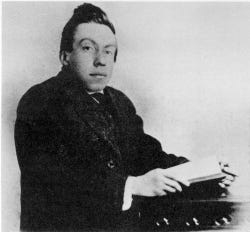
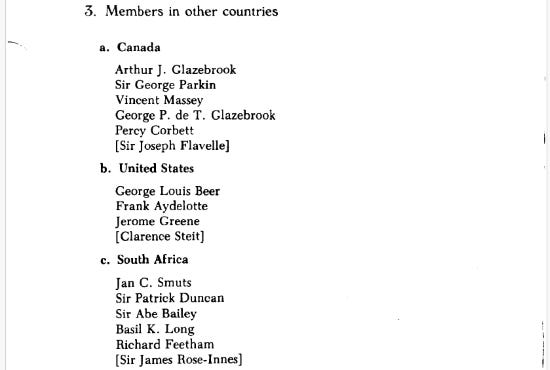
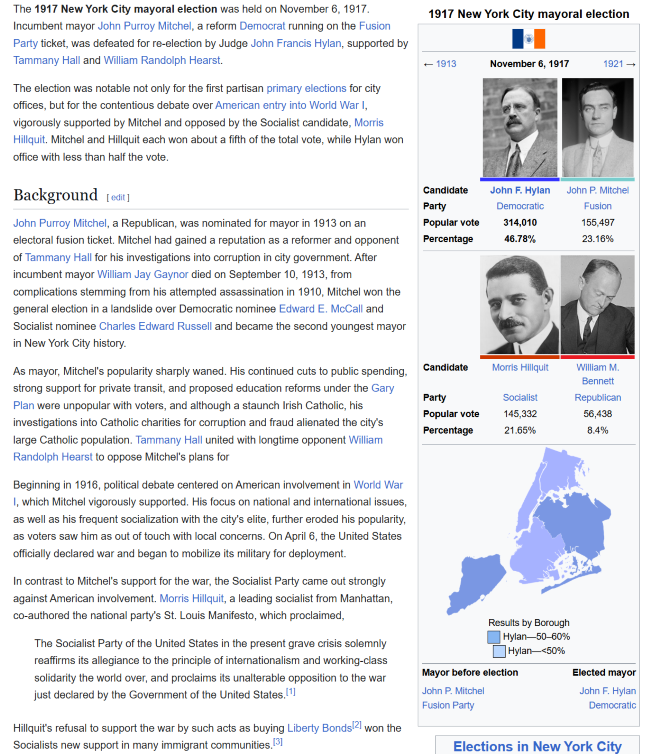
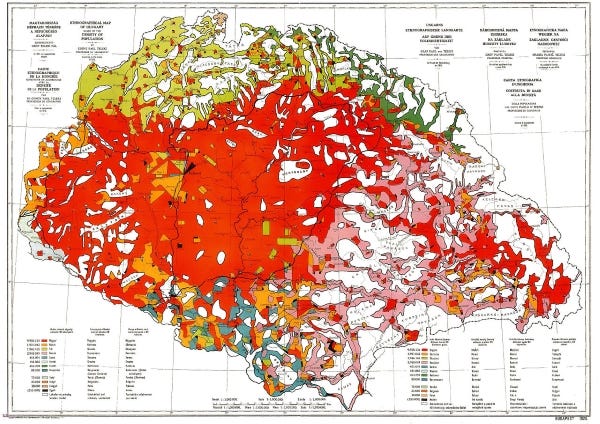
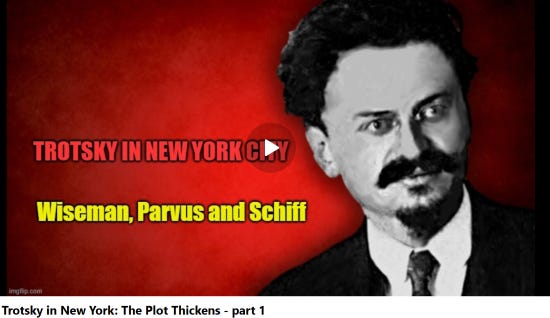
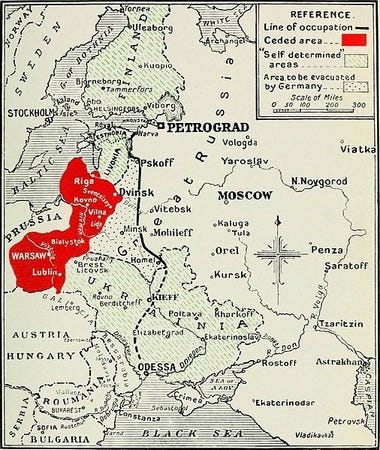
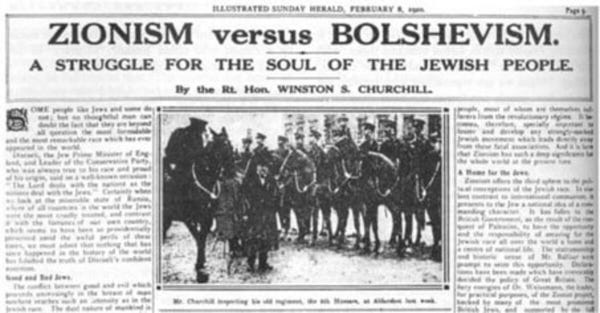
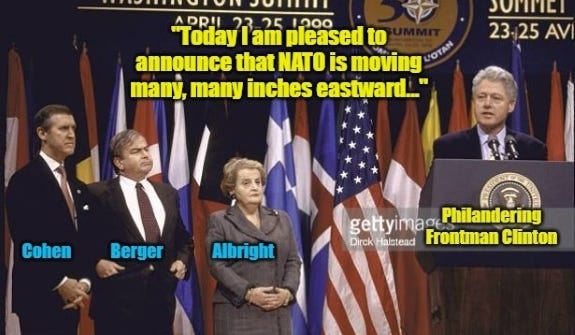

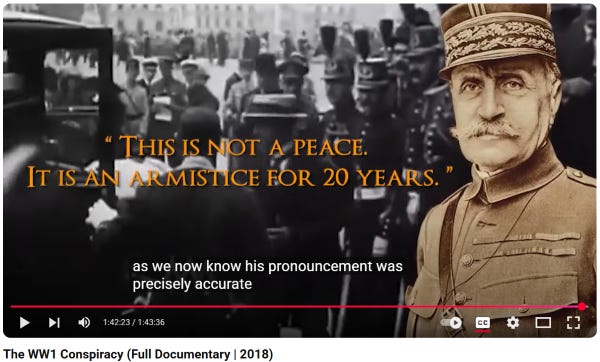
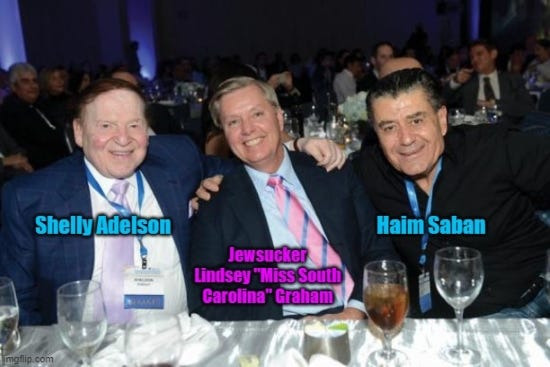
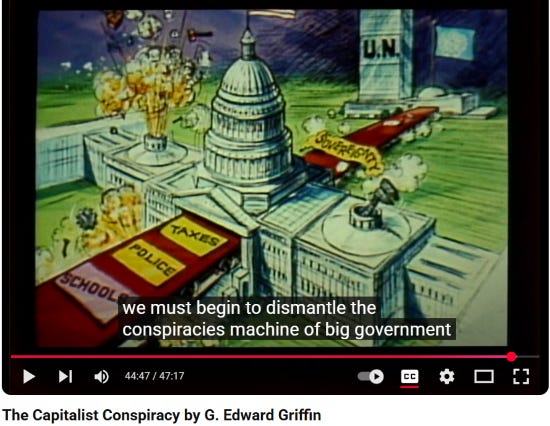
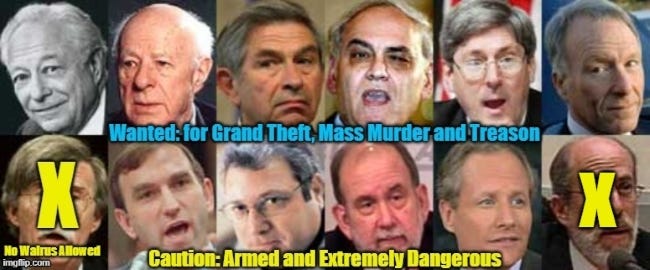

Daryll Cooper is listed as an author of _Provoked_
https://annas-archive.org/search?q=provoked
Wiki went BAT SHIT CRAZY on Cooper, deleted it, then when his entry returned, they
> Called
> Him
> a
> Nazi
and locked the page
https://en.m.wikipedia.org/wiki/Wikipedia:Articles_for_deletion/Darryl_Cooper_(podcaster)
wiki is just a place for jews to kvetch and keep score of insubordinate type.
They really, really didn't like the Tucker/Rogan interviews,
They really, really don't like anyone questioning their hoax